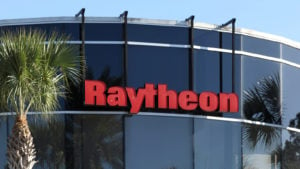Still, we’re seeing Russia spending record amounts within its own defense budget. That means the U.S. will likely follow suit in the near future. Though defense spending, as a percentage of total GDP, is below 2010’s high (60%), we’re only slightly off this year (50% of GDP). And that top-line number will likely keep rising, especially considering we’re back to healthy GDP growth at about 5% for the preceding quarter.
This year, defense stocks as measured by the iShares US Aerospace & Defense ETF (BATS:ITA) only climbed 3.7%. That starkly contrasts with the wider market’s 18%+ total return this year. Tailwinds are accumulating, and these defense stocks to buy could be your best performers in the coming months.
RTX Corp (RTX)

RTX Corp (NYSE:RTX) massively underperformed within the defense sector, losing nearly 20% since January. Still, the past month marked a reversal as shares climbed nearly 10%. That trend is likely to continue on the heels of increasingly bullish news for the defense stock.
Last month RTX beat analyst expectations for both earnings (hitting $1.25 per share) and revenue (netting $18.95 billion). Additionally, RTX demonstrated its financial strength by approving $10 billion in stock buybacks.
In fact, the company approved a $0.59 dividend per share, marking a 5.49% total yield when combined with buybacks. This commitment to shareholder value, coupled with recent underperformance, makes RTX one of the best defense stocks to buy considering its financial strength and material undervaluation.
Morningstar pegs RTX’s fair value price at $112 per share, or nearly 40% above where it trades today. Likewise, the company’s deep contractual relationship with the U.S. government helps forecast revenue and business cycles for years to come, offering investors predictability as shares continue climbing closer to fair value.
Palantir Technologies (PLTR)

Palantir Technologies (NYSE:PLTR) is capturing headlines as an artificial intelligence (AI) stock. But don’t let that cloud its fundamental strength among defense stocks.
Though often criticized for its reliance on government contracting compared to its smaller corporate segment, Palantir consistently scores large slices of defense spending. And, governments and defense sector players are opening their eyes to AI’s potential on the battlefield. That’s a bullish indicator for Palantir.
Last month, Palantir secured a $250 million contract from the U.S. Army to develop AI tools for the defense branch. Palantir’s products saw the Ukrainian conflict as a sort of proving ground. Analysts assessed the company’s tools as “shaping the future of warfare.”
As conflict becomes more tech-driven and autonomous, decision-makers at all levels are leveraging AI-integrated platforms to affect change on the battlefield. And Palantir is at the top of the list of defense stocks to buy if you want to capture this emerging warfare trend.
AeroVironment (AVAV)

Indeed, warfare is changing and integrating greater reliance on autonomous vehicles. And AeroVironment (NASDAQ:AVAV), an unmanned aircraft manufacturer, is likewise positioned to capture much of that growing upside.
This week, AeroVironment’s unmanned aircraft (JUMP 20 Group 3) marked a major milestone. The aircraft deployed in support of a multi-domain (air, sea, land, and digital) exercise in Poland.
Expanding AeroVironment’s prior scope, which focused mostly on surveillance and reconnaissance, the new platform includes electronic warfare elements. These tools let battlefield commanders scramble adversary communications, surveil the same platforms, and help geo-locate based on where those signals originate. Electronic warfare aircraft have largely been restricted to the manned variety. And AVAV’s entrance into the space means big successes on the horizon for this defense stock.
Also, AVAV is growing, as it is set to buy partner Tomahawk Robotics for $120 million. Tomahawk already supplied many core functions within AVAV’s drones, and the purchase marks two bullish indicators. First, it means AVAV is financially secure enough to lock in an acquisition this large. Second, bringing Tomahawk directly within its vertical means AVAV will reduce supply chain friction, saving time and money in the long run.
On the date of publication, Jeremy Flint held no positions in the securities mentioned. The opinions expressed in this article are those of the writer, subject to the InvestorPlace.com Publishing Guidelines.
Jeremy Flint, an MBA graduate and skilled finance writer, excels in content strategy for wealth managers and investment funds. Passionate about simplifying complex market concepts, he focuses on fixed-income investing, alternative investments, economic analysis, and the oil, gas, and utilities sectors. Jeremy’s work can also be found at www.jeremyflint.work.
